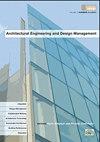A novel mathematical multi-criteria decision-making model for optimizing life cycle energy and cost in construction projects planning
IF 2.5
4区 工程技术
Q2 CONSTRUCTION & BUILDING TECHNOLOGY
Architectural Engineering and Design Management
Pub Date : 2022-11-03
DOI:10.1080/17452007.2022.2104207
引用次数: 2
Abstract
ABSTRACT Today, energy management systems are usually assessed as key to sustainable development goals. One of the best criteria for energy management systems in construction projects is Life Cycle Energy Analysis (LCEA). This research is a quantitative-qualitative study based on a Multi-Criteria Decision-Making (MCDM) model. This research involves four stages: library study, statistical survey, descriptive study, and case study. The review of previous studies showed that the LCEA and MCDM alone could not provide a comprehensive energy consumption management assessment model, due to inherent uncertainty and the existence of various analysis parameters; however, when are used in an integrated framework; the LCEA & MCDM hybrid approach serves as the best instruments to assess energy management systems. This research has proposed a newly developed hybrid multi-objective mathematical decision-making model to select appropriate and optimum options for all building shell components to optimize and manage the Cost and Energy of the Building Life Cycle. The life cycle energy analysis of an educational building in a case study showed that optimization using the proposed model saves about 16% of energy during the lifetime of the building. In addition, the investment payback period for this optimization is less than seven months in the first year of operation.一种新的建筑项目规划生命周期能量和成本优化数学多准则决策模型
今天,能源管理系统通常被评估为可持续发展目标的关键。建筑项目能源管理系统的最佳标准之一是生命周期能源分析(LCEA)。本研究是基于多准则决策(MCDM)模型的定量定性研究。本研究包括图书馆研究、统计调查、描述研究和个案研究四个阶段。回顾前人的研究发现,由于存在固有的不确定性和各种分析参数的存在,LCEA和MCDM本身并不能提供一个综合的能耗管理评价模型;但是,当被用于集成框架时;LCEA和MCDM混合方法是评估能源管理系统的最佳工具。本研究提出了一种新的混合多目标数学决策模型,对所有建筑外壳构件选择合适的和最优的方案,以优化和管理建筑生命周期的成本和能源。以某教育建筑为例进行了生命周期能源分析,结果表明,该模型在建筑生命周期内可节约约16%的能源。此外,该优化的投资回收期在运营的第一年不到7个月。
本文章由计算机程序翻译,如有差异,请以英文原文为准。
求助全文
约1分钟内获得全文
求助全文
来源期刊
CiteScore
5.80
自引率
3.40%
发文量
30
期刊介绍:
Informative and accessible, this publication analyses and discusses the integration of the main stages within the process of design and construction and multidisciplinary collaborative working between the different professionals involved. Ideal for practitioners and academics alike, Architectural Engineering and Design Management examines specific topics on architectural technology, engineering design, building performance and building design management to highlight the interfaces between them and bridge the gap between architectural abstraction and engineering practice. Coverage includes: -Integration of architectural and engineering design -Integration of building design and construction -Building design management; planning and co-ordination, information and knowledge management, vale engineering and value management -Collaborative working and collaborative visualisation in building design -Architectural technology -Sustainable architecture -Building thermal, aural, visual and structural performance -Education and architectural engineering This journal is a valuable resource for professionals and academics (teachers, researchers and students) involved in building design and construction, including the following disciplines: -Architecture -Building Engineering -Building Service Engineering -Building Physics -Design Management and Design Coordination -Facilities Management Published papers will report on both fundamental research dealing with theoretical work and applied research dealing with practical issues and industrial innovations. In this way, readers explore the interaction between technical considerations and management issues.

 求助内容:
求助内容: 应助结果提醒方式:
应助结果提醒方式:


